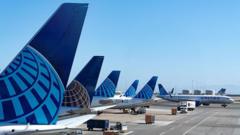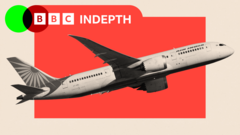The Trump administration has officially launched an investigation into the importation of commercial aircraft, jet engines, and related parts, igniting speculation about impending tariffs on these critical aerospace products. As detailed in a recent federal notice, the inquiry, initiated by Commerce Secretary Howard Lutnick on May 1, is driven by a provision of the Trade Expansion Act that empowers the president to impose tariffs on foreign imports deemed essential to national security.
This move follows previous tariff actions by President Trump on goods such as aluminum and steel. Moreover, recent inquiries into various industries, including semiconductors and pharmaceuticals, further underscore the administration's protectionist approach.
The Commerce Department aims to gather insights from the aerospace industry regarding domestic demand for planes, engines, and parts, as well as how much of that demand can be met by domestic production. The investigation will also examine the influence of foreign suppliers in the market and any favoritism from foreign governments.
Concerns loom over the impact of potential tariffs on the aerospace sector, which has consistently recorded a substantial trade surplus, thanks in part to a reliance on a diverse range of specialized suppliers scattered globally. With projections suggesting that the aerospace industry will generate approximately $125 billion in exports this year, it remains a cornerstone of American manufacturing alongside oil and gas.
Eric Fanning, president of the Aerospace Industries Association, expressed in a statement the importance of balancing domestic supply chain growth with the preservation of the trade framework that has solidified the U.S.'s status in the global aerospace market.
Boeing, the major manufacturer of commercial planes, noted that the direct repercussions of existing tariffs have been minimal thus far; however, they are wary of the long-term implications for their suppliers. CEO Kelly Ortberg cited a 10% tariff on components imported from Japan and Italy. Meanwhile, companies like RTX and GE Aerospace have projected significant tariff-related expenses, estimating losses of approximately $850 million and $500 million, respectively.
Historically, numerous governments have utilized tariffs and subsidies to bolster their aviation industries. The ongoing rivalry between the U.S. and the EU over subsidies to aerospace giants Boeing and Airbus has been well-documented, with both entities reaching a compromise in 2021 to collaborate against China's increasing prevalence in major industries.
As opinions split across the sector regarding the proposed tariffs, industry stakeholders remain poised for further developments in the investigation's findings and how they may shape the future of American aerospace trade.






















